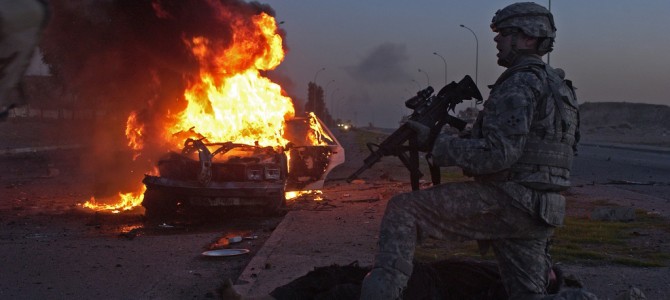Let’s just say that the Iraq army isn’t exactly anchoring a democratic awakening in Middle East.
Earlier this week, Iraq’s armed forces in Mosul – trained and supplied by United States to secure the wellbeing of its people and institutions – reportedly dropped their guns, shed their uniforms, and surrendered to black-flag waving Sunni insurgents in a mere four days. No Thermopylae here. And around a half a million civilians have left the second largest city in Iraq to flee what is surely going to become a hotbed of beheadings and other assorted acts of Jihad. And now, according to CNN, the Islamic State of Iraq and Syria also has almost complete control of Tikrit.” al-Qaida (or something very much like it) is definitely on the run – right toward our allies.
Not that we should be surprised. Back in 2010, Army Gen. George Casey warned that the 130,000-strong Iraqi police and soldiers lacked leaders, were deserting by thousands, were hampered by corruption, displayed little will to fight and would probably never be able to fend off insurgents. Obviously, not much has changed, despite President Obama’s assertion in 2011 that that war had ended and “Iraqis have taken full responsibility for their country’s security.” Put it this way: Prime Minister Nouri al-Malikihad’s crack “Crisis Unit,” which consists of civilian volunteers, is preparing a counteroffensive to the north. A makeshift militia is what ten years, thousands of American lives and hundreds of billions of dollars buys in those parts.
Still, it’s difficult to believe any administration would allow the fall of Iraq to happen. America would be leaving a nation with an army that can’t defend itself from nomadic terror groups much less powerful neighbors. If the United States doesn’t stop the ‘Islamic State of Iraq and Syria’ (and, incidentally, Islamists should really find a name that’s a little less derivative), we would be allowing a budding terror state to emerge in Iraq. And in some ways it was our intervention, coupled with the inability of Iraqis to form a cohesive nation, that helped created the vacuum and political environment that allows militant army (one that Ayman al Zawahiri believes is too uncompromising) to stake out an Islamic state which including now Iraq’s largest oil refinery. This ending would, to say the least, make a decade 0f sacrifice appear counterproductive.
Doing nothing is another choice. This probably means the Sunni-Shia split will continue to descend into violence, radicalism will proliferate, and destabilize the region. Thousands of civilians will, doubtlessly, perish.
Some will, no doubt, argue that doing nothing (and we might very well be doing something soon) means that more than 4,400 U.S. troops and over $700 billion had been wasted in a war that ended but was not won. Perhaps. But a more important matter is this: would the death of another 4,000, or 400, or four, bring about a preferable outcome or a set of conditions that allow the United States to convincingly declare victory? If a decade of nation building brought us this, what could we possible gain by seriously reengaging? Clearly, to make it work the American people would need to be prepared to make a generational commitment – and polls don’t tell us that we’re in the mood for an open-ended conflict in the Middle East.
These are horrible choices, indeed. While millions of civilians no longer experience life under the regime of Saddam Hussein, and we should not forget the sacrifice thousands of soldiers made to allow that to happen, it gets increasingly difficult to imagine that the United States has gained anything worthwhile from its invasion of Iraq. It’s difficult to understand how spending another five or ten years sorting out a sectarian civil war can possible be in our best interests.
Follow David Harsanyi on Twitter.








